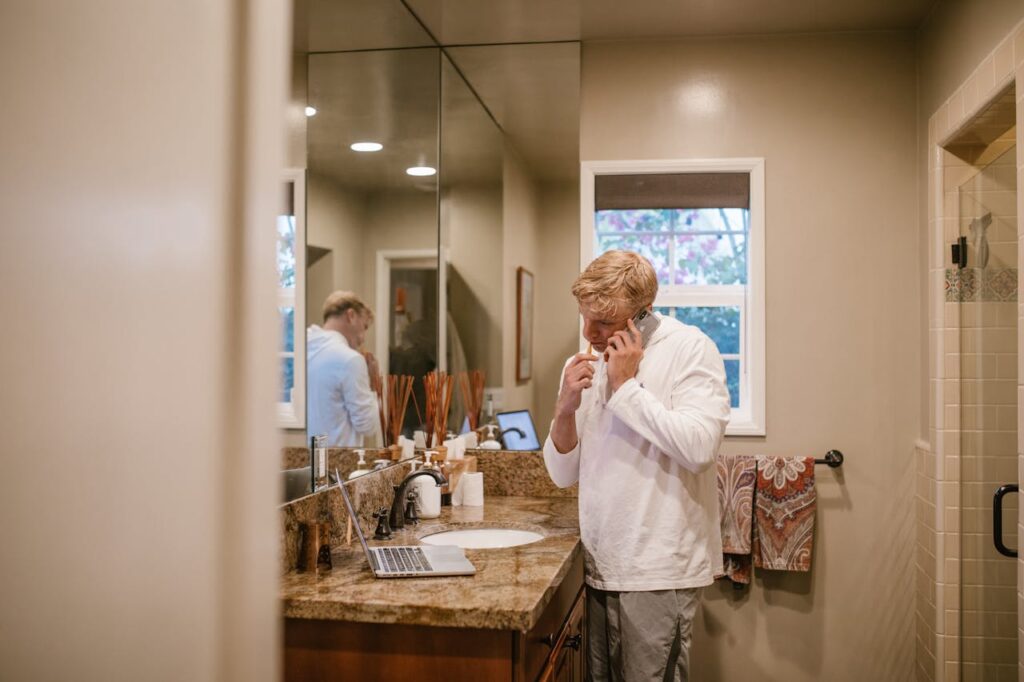Good phone manners can make all the difference in how your conversations are received. Whether you’re speaking with a colleague, a client, or a friend, using proper etiquette helps ensure that your message is clear and your interaction is respectful.
In this post, we’ll cover essential phone manners that will help you communicate more effectively. From greeting the caller to ending the conversation gracefully, these simple tips will guide you in making every phone call a positive experience.
The Evolution of Phone Communication and Its Impact
Over the years, our phone system has evolved dramatically. We’ve moved from bulky landlines with rotary dials to advanced smartphones and internet-based communication. Initially, landline phones were the primary means of communication.
With the introduction of cordless phones and mobile phones, connecting with others became more convenient and portable. Smartphones further revolutionized communication by integrating voice calls, text messaging, and internet access into one device.
Today, Voice over Internet Protocol (VoIP) services like Skype and Zoom offer even more advanced options for voice and video calls. These technologies provide flexible and cost-effective ways to communicate.
Despite these advancements, phone conversations have become less common. People increasingly prefer text messaging, instant messaging, and social media for their communication needs. This shift reflects changes in communication habits and technology.
However, maintaining proper phone manners and etiquette is still important, both personally and professionally.
Essential Phone Manners for Every Call
Mastering good phone etiquette is crucial for clear and respectful communication. These practices help make every call more productive and leave a positive impression. Here are six essential tips to improve your phone manners:

1. Greet Warmly
When starting a phone conversation, a friendly greeting sets a positive tone for the interaction. Begin by stating your name and offering a polite introduction to make the other person feel welcomed and valued.
For example, you might say, “Hello, this is Lydia. How can I assist you today?” This approach immediately clarifies who you are and opens the floor for the conversation to proceed smoothly.
For family and friends, the approach is a bit more casual but still polite. You might say, “Hi, it’s Lydia! How’s everything going with you today?” This greeting maintains a friendly and informal tone, making the conversation feel comfortable and inviting.
Starting with a clear and friendly introduction helps set a positive tone in both cases. Whether you’re discussing work or catching up with family and friends, this is a key aspect of good phone manners.
2. Listen Actively
When you’re on the phone, it’s important to give your full attention to the person you’re speaking with. This means not just hearing their words but really listening to what they are saying.
Avoid interrupting them, even if you have something to say or a response ready. Let them finish their thoughts before you jump in.
Active listening shows that you care about what they’re saying and that you’re fully engaged in the conversation. For example, if your friend is sharing a story about their day, listen carefully until they’ve finished talking.
This lets them know that their feelings and experiences are important to you. It also demonstrates good phone etiquette and helps you understand them better, making the conversation more meaningful and respectful.
3. Be Polite and Professional
Using polite language throughout a phone call is essential for maintaining good phone manners and a courteous, respectful tone. Simple phrases like ‘please’ and ‘thank you’ can make a big difference in how the conversation feels.
For instance, if you’re asking for information or a favor, saying “Could you please provide me with the details?” is much more polite than just asking bluntly. Similarly, expressing gratitude with “Thank you for your help” shows appreciation and respect for the other person’s time and effort.
Even if the conversation becomes challenging or tense, staying professional and polite helps in managing the situation effectively.
Maintaining a calm and courteous demeanor, even in difficult moments, helps keep the discussion on track and can lead to a more positive resolution. Politeness, professionalism, and good phone etiquette not only help in resolving issues smoothly but also leave a good impression on the other person.
4. Avoid Multitasking

When you’re on the phone, it’s important to focus only on the call. Trying to multitask, like checking emails or doing other work while talking, can lead to mistakes and make you seem uninterested.
For example, if you’re talking to a coworker about a project and you’re also typing on your computer, you might miss important details or give the wrong information. This can come across as if you don’t care about what they’re saying and doesn’t reflect good phone manners.
Instead, make sure to give the call your full attention. Sit down in a quiet spot, put away other tasks, and listen carefully to the person on the other end of the line.
This way, you’ll understand their points better, avoid misunderstandings, and have a more productive and engaging conversation.
5. Handle Interruptions Gracefully
If you need to put someone on hold during a phone call, it’s important to do so politely. Start by letting them know why you’re putting them on hold. For example, you might say, “I need to check some information, so I’ll put you on hold for a moment. Thank you for your patience.”
While they’re on hold, make sure not to keep them waiting for too long. Aim to resolve whatever you need quickly and return to the call as soon as possible. After you return, acknowledge their patience by saying, “Thank you for waiting. I appreciate your patience.”
If any interruptions happen, such as another call coming in or background noise, quickly address them. For instance, if there’s a noise, you could briefly explain, “I’m sorry for the interruption; let me take care of that.” Then smoothly transition back to the main conversation by summarizing what was discussed before the hold.
6. End the Call Politely
Ending a phone conversation on a positive note is an important part of good phone manners. When you’re wrapping up the call, use a friendly and courteous closing statement to show appreciation for the conversation. For example, you might say, “Thank you for your time! I hope you have a great day!”
For personal calls, you can keep it casual but still polite. You could say something like, “It was nice catching up with you! Have a wonderful day!” or “Thanks for chatting. I hope everything goes well with your plans!”
If possible, let the other person hang up first. This small gesture shows that you value their time and don’t want to rush them. It also helps ensure that you both end the call on a positive and clear note.
Conclusion
Essential phone manners are important whether you’re at work or talking with friends and family. Using polite and respectful behavior during phone calls helps make sure that each conversation is clear and productive.
Good phone etiquette improves how you communicate at work, making you look more professional. Additionally, they strengthen your relationships with friends and family by building trust and positive connections.
By following these simple phone manners, you can make every call more effective and enjoyable for everyone involved.
If you found this topic interesting, be sure to check out my previous post on cell phone etiquette for more tips on proper phone usage.














